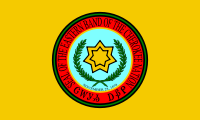Eastern Band of the Cherokee
| Flag of the Eastern Band Cherokee | |
| Total population | |
|---|---|
| 16,000+ | |
| Regions with significant populations | |
| Western North Carolina | |
| Languages | |
| English, Cherokee | |
| Religion | |
| Christianity (mostly Protestant), traditional tribal religion | |
| Related ethnic groups | |
| Cherokee Nation, United Keetoowah Band of Cherokee Indians |
The Eastern Band of Cherokee Indians (EBCI), (Cherokee: ᏣᎳᎩᏱ ᏕᏣᏓᏂᎸᎩ, Tsalagiyi Detsadanilvgi) is a federally recognized Native American tribe in the United States of America, who are descended from the small group of 800 Cherokee who remained in the Eastern United States after the Indian Removal Act moved the other 15,000 Cherokee to the west in the 19th century. They were required to assimilate and renounce tribal Cherokee citizenship.
The history of the Eastern Band closely follows that of the Qualla Boundary, a land trust made up of an area of their original territory. When they reorganized as a tribe, they had to buy back the land from the US government. The EBCI also own, hold, or maintain additional lands in the vicinity, and as far away as 100 miles (160 km) from the Qualla Boundary. The Eastern Band of Cherokee Indians are primarily the descendants of those persons listed on the Baker Rolls of Cherokee Indians. They gained federal recognition as a tribe in the 20th century.
The Eastern Band of Cherokee Indians is one of three federally recognized Cherokee tribes, the others being the Cherokee Nation and the United Keetoowah Band of Cherokee Indians, both based in Oklahoma. Its headquarters is in the namesake town of Cherokee, North Carolina in the Qualla Boundary, south of the Great Smoky Mountains National Park.
The Eastern Band members are primarily descended from about 800 Cherokee who did not participate in the Trail of Tears to Indian Territory (now Oklahoma). Principal Chief Yonaguska, with the help of his adopted European-American son, William Holland Thomas, managed to avoid removal. The Eastern Band of Cherokee Indians have maintained many traditional tribal practices. Many prominent Cherokee historians are affiliated with, or are members of the Eastern Band.
...
Wikipedia

